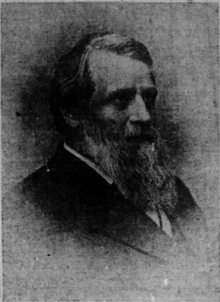John Eaton (general)
For other people named John Eaton, see John Eaton (disambiguation).
| John Eaton | |
|---|---|
 | |
| United States Commissioner of Education | |
|
In office March 16, 1870 – August 5, 1886 | |
| President |
Ulysses Grant Rutherford Hayes James Garfield Chester Arthur Grover Cleveland |
| Preceded by | Henry Barnard |
| Succeeded by | Nathaniel Dawson |
| Personal details | |
| Born |
December 5, 1829 Sutton, New Hampshire, U.S. |
| Died |
February 9, 1906 (aged 76) Washington, D.C., U.S. |
| Alma mater |
Dartmouth College Andover Theological Seminary Rutgers University, New Brunswick |
| Military service | |
| Allegiance |
• Union |
| Service/branch | Union Army |
| Rank |
|
| Unit | 27th Ohio Infantry |
| Commands | 63rd U.S. Colored Infantry |
| Battles/wars | American Civil War |
John Eaton, Jr. (December 5, 1829 – February 9, 1906) was a U.S. Commissioner of Education and a brevet brigadier general during the American Civil War.
Early life
Eaton was born in Sutton, New Hampshire,[1] and attended Thetford Academy in Vermont. He was the eldest of nine children and his father was a farmer. He graduated from Dartmouth College in 1854, studied at Andover Theological Seminary, and was ordained in 1862 to the Presbyterian ministry. He had to teach all four years he was in college in order to pay his board and tuition. He received degrees of A.M. and later an L.L.D. from Rutgers.[2][3]
He then taught school in Cleveland, OH and was the acting superintendent of schools in Toledo from 1856-1859.
Civil War
After being ordained in 1862, Eaton entered the American Civil War as a chaplain of the 27th Ohio Volunteer Infantry. In November of that year, after Lincoln's preliminary Emancipation Proclamation, Maj. Gen. Ulysses S. Grant appointed him superintendent of freedmen and was later given supervision of all military posts from Cairo to Natchez and Fort Smith. In November 1863, Grant appointed him as the Superintendent of Negro Affairs for the Department of the Tennessee; there Eaton supervised the establishment of 74 schools. In 1863, Eaton was made colonel of the 63rd United States Colored Infantry, and, in March 1865, he was advanced to brevet brigadier general.[3]
Postbellum career
General Eaton left the military and eventually returned to his career in education. He remained with the freedman bureau until he was mustered out and then became editor of the Memphis Daily Post in 1866. From 1867-1869 he was the state superintendent of schools of Tennessee.[3] He was then appointed United States Commissioner of Education in 1870 and served with great efficiency in the Bureau of Education where he, among other things, organized Washington, D.C.'s Board of Education and reorganized the Bureau of Refugees, Freedmen, and Abandoned Lands.
In 1886–1891, Eaton was president of Marietta College, and, in 1895, he was appointed president of Sheldon Jackson College in Sitka, Alaska. In 1898, he became inspector of education in Puerto Rico and played a role in the centralization of its educational system. At the same time, he was the president of Westminster College in Salt Lake City. He also served as Councillor of the American Public Health Association, Vice President of the American Association for the Advancement of Science and president of the Association of Social Science. He was a representative of the Interior Department at the centennial exposition and the organizer of the educational exhibit at New Orleans. He was president of the national congress of education and of the American Society of Religious Education.[3]
Eaton wrote a history of Thetford Academy, "Mormons of Today", "The Freedmen in the War", "Schools of Tennessee" and several reports, addresses and magazine articles.[3]
After several years of failing health, he took ill and died one day later in his apartment in the Concord Flats in Washington, D.C.. Four years later, John Eaton Elementary School was named for him.[2][3]
See also
References
- Eicher, John H., and Eicher, David J., Civil War High Commands, Stanford University Press, 2001, ISBN 0-8047-3641-3.
 This article incorporates text from a publication now in the public domain: Gilman, D. C.; Thurston, H. T.; Colby, F. M., eds. (1905). "article name needed". New International Encyclopedia (1st ed.). New York: Dodd, Mead.
This article incorporates text from a publication now in the public domain: Gilman, D. C.; Thurston, H. T.; Colby, F. M., eds. (1905). "article name needed". New International Encyclopedia (1st ed.). New York: Dodd, Mead.
Notes
External links
- President Rutherford B. Hayes on U.S. Commissioner of Education John Eaton: Original Letter Shapell Manuscript Foundation
| Political offices | ||
|---|---|---|
| Preceded by Henry Barnard |
United States Commissioner of Education 1870–1886 |
Succeeded by Nathaniel Dawson |